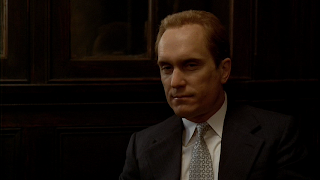Tom
explains what he has learned about Sollozzo: he’s into narcotics, growing the
poppy in Turkey Sicily New York
 |
| Children play on the street: life continues as normal as dark deeds are discussed in the dimly lit interiors. |
VIRGIL SOLLOZZO: Don Corleone, I need a man who has powerful
friends. I need a million dollars in cash. I need, Don Corleone, those
politicians that you carry in your pocket like so many nickels and dimes.
Sollozzo
learns some very important information about the Corleone family in this scene
– information that will aid in his strategy to overthrow Vito’s power later.
When Vito asks what the interest for the Tattaglia family is Sollozzo shoots a
glance to Tom saying, “My compliments,” indicating his recognition of how
thorough Tom is. Later in the scene when Sonny speaks out of turn Sollozzo
learns that Sonny is impetuous, anxious and possibly excited about the deal
he’s offering.
The
scene goes on for 12 shots lasting 1 minute 8 seconds before we know that anyone
other than Vito, Tom and Sollozzo are in the room. Granted, we saw Sollozzo
greeting all the others before this scene started, but we aren’t made
explicitly aware that Sonny, Fredo, Tessio and Clemenza are in the room until
more than a minute in. Why doesn’t Coppola start the scene with an establishing
shot showing all the men in the room? Before answering that we should ask why
Corleone has so many men sitting with him while Sollozzo is alone. Of course
Tom and Sonny, as Consigliere and heir apparent, would be there. Fredo will
also one day be involved in the family business, explaining his presence, but
what about the Capo Regimes – Tessio and Clemenza? I offer this as a possible
explanation: Don Corleone’s having all those men present asserts his position
of power over Virgil Sollozzo and the Tattaglia family. It is designed to make
Sollozzo feel intimidated upon coming to this meeting. I think it only natural
that Sollozzo would be alone. He is entering someone else’s territory to
propose a business arrangement. He has no reason to feel threatened and so
would not have protection with him. But why the absence of an establishing
shot? It comes at the moment Corleone has heard the deal and stands up to
change his seat and tell Sollozzo his answer is ‘no.’ It clues the audience in
to his power play at the moment he’s about to assert his power by denying
access to ‘his’ politicians.
 |
| The first shot that shows everyone in the room has Corleone rising to move closer to Sollozzo. |
DON CORLEONE: What’s the matter with
you? I think your brain’s going soft from all that comedy you’re playing with
that young girl. Never tell anybody outside the family what you’re thinking
again.
With
that Vito states quite clearly what was only implied earlier in the film – that
he is aware of his son’s extra-marital affair with Lucy. He clearly
disapproves, but more importantly, he disapproves of Sonny revealing his
thoughts to a potential enemy.
 |
| First Vito looks disapprovingly at Sonny for his foolish outburst. Then cut to... |
 |
| ...Clemenza, with his eyes averted. Cut to... |
 |
| ...Tom clearly knowing that Sonny was out of line. Cut to... |
 |
| ...Sollozzo smirking. He has found something he can bite at. |
Go to Part VI: "If I wanted to kill, you'd be dead already."




Tom makes the plausible argument that because of the money potential in narcotics, any of the crime families that invests in the drug trade will be able to buy more political influence. This argument (perhaps by contrast with Sonny's) isn't about greed for money as an end in itself; it's about power. It will later emerge that the Don isn't persuaded by Tom's reasoned argument. Quite the contrary, the Don is convinced that any crime family that makes a move into drugs will LOSE political influence, and thereby lose power, so that a move into drugs would be self-destructive. It will emerge that the other families insist the one and all make the move into drugs and that the Corleones provide political influence and legal protection to safeguard the investment. It appears at this point that the Don is being asked to provide an accommodation. The ostensible request in fact a demand. Ironically, it is an "offer" he can't refuse.
ReplyDelete